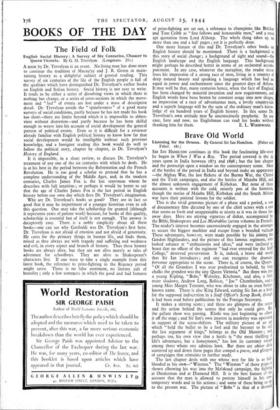BOOKS OF THE DAY
The Field of Folk
English Social History : A Survey of Six Centuries, Chaucer to Queen Victoria. By G. M. Trevelyan. (Longmans. 21s.)
A BOOK by Dr. Trevelyan ix an event. No living man has done more to continue the tradition of Macaulay and J. R. Green in main- taining history as a delightful subject of general reading. This survey of six centuries of the life of the English people is full of the qualities which have distinguished Dr. Trevelyan's earlier books on English and Italian history. Social history is not easy to write. It tends to be either a series of dissolving views in which there is nothing but change, or a series of cross-sections in which the move- ment and " feel " of events are lost under a mass of descriptive detail. Dr. Trevelyan avoids the " spinelessness " of a good many surveys of social conditions, partly because he has not made his book too short—there are limits beyond which it is impossible to abbre- viate without distortion—and partly because he has been skilful enough to weave into his account of social development the general pattern of political events. Even so it is difficult for a reviewer already familiar with English political, history to know how far that social development would be intelligible without such previous knowledge, and a foreigner reading this book would do well to follow the political story, chapter by chapter, in Dr. Trevelyan's History of England. It is impossible, in a short review, to discuss Dr. Trevelyan's treatment of any one of the six centuries with which he deals. He is at his best in the period between the Reformation and the French Revolution. He is too good a scholar to pretend that he has a complete understanding of the Middle Ages, and, in the modern centuries, Charles James Fox is the last statesman whom he describes with full intuition ; or perhaps it would be better to say that the age of Charles James Fox is the last period in English history before our own day which fires Dr. Trevelyan's imagination.
Why are Dr. Trevelyan's books so good? They are in fact so good that it may be impertinent of a younger historian even to ask this question. One may take the scholarship for granted (although it represents years of patient work) because, for books of this quality, scholarship is essential but of itself is not enough. The answer is deceptively easy. There is a noble simplicity about all these books—one can see why Garibaldi was Dr. Trevelyan's first hero.
r. Trevelyan is not afraid of emotion and not afraid of generosity. He cares for the primary things in human life, and finds them, mixed as they always are with tragedy and suffering and weakness and evil, in every aspect and branch of history. Thus these history books are always alive, but they are not alive merely as tales of- adventure for schoolboys. They are alive as Shakespeare's characters live. If one were to take a single example from this latest book, the reference to prize-fighting in the Regency period might serve. There is no false sentiment, no literary cult of brutality ; only a few sentences in which the good and bad features
of prize-fighting are set out, a reference to champions like Belcher and Tom Cribb as "fine fellows and honourable men," and a most apt quotation from Lord Althorp. The whole thing takes up no more than one and a half pages ; yet it is perfectly done.
One more feature of this and Dr. Trevelyan's other books on English history should be mentioned. There is a background to this story of social change ; a background of sight and sound—the English landscape and the English language. This background might perhaps be described better in terms of an orchestral accom- paniment. In any case, whatever the metaphor, the reader never loses his impression of a strong race of men, living in a country of deep natural beauty and speaking a language which has had no equal in power and enchantment since the greatest days of Athens. It may well be that, many centuries hence, when the face of England has been changed by material invention and new requirements, and English words have been beaten by constant usage into new shapes, an impression of a race of adventurous men, a lovely countryside and a superb language will be the sum of the ordinary man's know- ledge of six hundred years of English history. In this sense Dr. Trevelyan's own attitude may Be unconsciously prophetic. In any case, here and now, no Englishman can read his books without


























 Previous page
Previous page